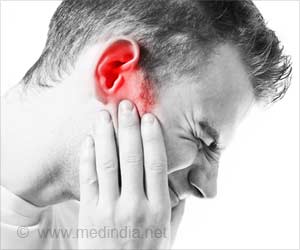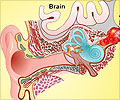- Tinnitus, characterized by buzzing, hissing, or ringing sounds in the ears
- Bi-sensory treatment consistently reported improvements in their quality of life, lower handicap scores, and significant reductions in tinnitus loudness
- More than 60% of participants experienced reduced tinnitus symptoms after six weeks of active treatment of bi-sensory stimulation
Reversing Synchronized Brain Circuits Using Targeted Auditory-Somatosensory Stimulation to Treat Phantom Percepts: A Randomized Clinical Trial
Go to source).
The trial specifically focused on individuals with somatic tinnitus, a type of tinnitus where certain movements, like clenching the jaw, lead to changes in the pitch or loudness of the perceived sounds. It is estimated that 70% of tinnitus sufferers have this form.
Personalized Stimulation for Tinnitus Relief
During the trial, participants used a portable device developed by in2being, LLC, at home. The device was programmed based on each participant's tinnitus spectrum and incorporated electrical stimulation to create a bi-sensory stimulus.Throughout the trial, participants completed questionnaires such as the Tinnitus Functional Index (TFI) and Tinnitus Handicap Inventory (THI), which assess the impact of tinnitus on their lives. The loudness of their tinnitus was also evaluated.
Hear the Difference: Transforming Lives, One Tinnitus Treatment at a Time
The results indicated that participants consistently reported improved quality of life, lower handicap scores, and significant reductions in tinnitus loudness when they received the bi-sensory treatment. More than 60% of the participants experienced a significant reduction in tinnitus symptoms after six weeks of active treatment.Susan Shore, Ph.D., Professor Emerita in Michigan Medicine's Department of Otolaryngology and U-M's Departments of Physiology and Biomedical Engineering, expressed her optimism about the study's findings.
She stated that the personalized, bi-sensory stimulation used in the study could serve as an effective treatment for tinnitus, providing hope for millions of individuals suffering from the condition. These findings align with a previous study by Shore's team, which demonstrated that longer durations of active treatment resulted in more significant reductions in tinnitus symptoms.
- Reversing Synchronized Brain Circuits Using Targeted Auditory-Somatosensory Stimulation to Treat Phantom Percepts: A Randomized Clinical Trial - (https://pubmed.ncbi.nlm.nih.gov/37266943/)
Source-Medindia















